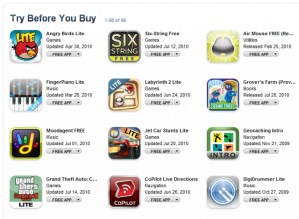
These days, the mobile industry seems focused on little more than mobile phone apps, as enormous numbers of companies and developers seek to monetize mobile Internet capabilities and increasingly sophisticated devices by offering programs, games, utilities, and Internet-based add-ons for phones. However, a new report from the Pew Internet & American Life Project finds that only 29 percent of U.S. adults have downloaded apps to their phones, and only 13 percent have actually paid to download apps. Moreover, while 35 percent of U.S. adults have apps on their phones, fewer than 24 percent actually use them.
“An apps culture is clearly emerging among some cell phone users, particularly men and young adults,” said Pew Internet associate director Kristen Purcell, in a statement. “Still, it is clear that this is the early stage of adoption when many cell owners do not know what their phone can do. The apps market seems somewhat ahead of a majority of adult cell phone users.”
The survey covered a sample of 1,917 cellphone-using adults and asked if they used phone apps and, if so, how. The results found that about 38 percent of adult cell phone owners bought a phone with apps pre-installed, and some 29 percent of adult cell phone owners have downloaded applications to their phones. HOwever, only about two thirds of folks with apps actually use them, which means that just under one quarter (24 percent) of U.S. adults use phone apps. And, as one might expect, app usage varies with Age: older adults are far less likely to use apps. And just to make U.S. adults seem even more clueless, Pew notes that fully one in ten cell phone owners don’t know if their phones have apps.
Overall, the survey found the mobile app users are more likely to be young, educated, and affluent; furthermore, the app using population also skews male and Hispanic, compared the broader U.S. adult population.
So how do people use their phones? For almost everything but apps, according to the report. Adult cell phone users reported taking pictures and sending/receiving text messages were by far the most common non-voice uses of their phones, with 76 and 72 percent usership rates, respectively. Farther down the scale, 38 percent said their accessed the Internet, 34 percent said they played games, handled email, or recorded video. Some 33 percent said they played music on their phones, and 30 percent engages in instant messaging. Next, at 29 percent, came apps.
Editors' Recommendations
- Arc Search, one of the best iPhone apps right now, just got even better
- 10 iPhone productivity apps you need to download right now
- The 10 best apps for a second phone number in 2024
- How to hide apps on your iPhone
- How to find downloaded files on an iPhone or Android phone

